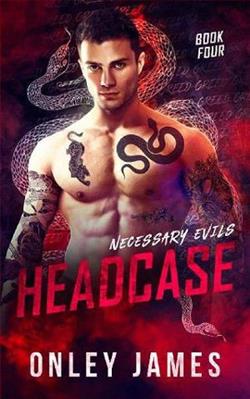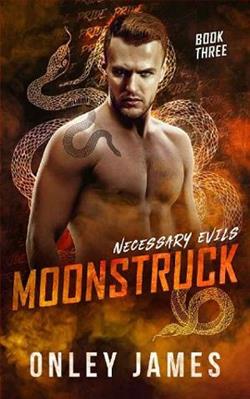Page 96 of Famous Last Words
Si turns his mouth down and tips his head towards her slightly, perhaps a grim acknowledgement of what she is talking about, perhaps not.
Charlie lowers himself gently on to the sofa next to her, a calm and kind gesture of support. She reaches to touch his knee lightly, just once, thinking of their talk in her garden, his stoic understanding.
And why can’t they be? Whycan’tthey be a couple? Luke’s gone, whatever happened in the warehouse. He’s gone.
Charlie’s body is warm next to Cam. He smells of that very specific male-just-showered scent. She thinks of him agreeing to come and showering hurriedly, and something sympathetic awakens inside her.
Tentatively, he drapes his arm along the back of the sofa. And something slots into place for Cam. They can be a united front. Maybe her pain isn’t a block standing in the way of her relationship with Charlie. Maybe he can help her with it. Maybe she could talk to him about it, and be supported by him.
She leans her body against his.
‘Ah, a pair of lovebirds,’ Si says. Not the kind of thing he would say when he was sober, and his teasing unsettles Cam.That they’re all rooting for her, but to do something which feels somehow wrong, at times, to her. Incorrect.
Just across from him, on the oak of Libby’s rustic mantelpiece, is a photograph of Libby and Si on their wedding day. Behind that is a piece of blue cardboard which says ‘Window to the Womb’ on it. An ultrasound clinic. The lack of drinking was one thing – Libby is often not drinking – but this is another. She calculates it. Is it too soon after the last loss? Cam thinks, Oh, please, please, please let it happen for them. Please don’t let it be an old one.
Libby arrives and goes to top up Cam’s drink again – though she hasn’t had any more herself – and Cam covers the rim with her hand. ‘No, I’m leaving,’ she says.
‘Right,’ Charlie says, getting to his feet, and Cam’s grateful for the show of support.
‘I’ll get Polly,’ she says to him.
She walks up to where her daughter’s sleeping. It’s not a nursery, exactly, but neither is it a guest room. Cam supposes it’s a nursery-in-waiting. Pale pink walls, high ceilings, two small windows – dollhouse windows. Black beams across the ceiling – God, Polly used to be fascinated by those as a baby; Cam had forgotten until just now. And now she’s enormous, four feet long in a sleeping bag, her baby.
Cam shakes her shoulder gently, then picks her up.
Her body yields into her mother’s like a warm sack of flour, and as Polly’s legs briefly hit Cam’s knees, she longs, suddenly, for those dreamy newborn days when her feet wouldn’t even reach Cam’s hips. A little hand dangling casually between her breasts. The puff of milk breath by her ear. She didn’t appreciate them when she had them, was so ready for them to be over, to be on to the next stage. Weaning. Walking. Sleep. She didn’t realize she was rushing it,rushing her, didn’t realize that they would only ever get those discrete nine months as a family of three before everything shattered. The bittersweet sadness that always sits alongside motherhood, the notion of gradually losing time, of letting go, is even more pronounced for Cam. Newborn Polly, with her silken blancmange thighs, gone for ever. Two-year-old Polly, who would squat in a demi-plié to inspect bugs in the garden, gone, too. You can’t keep them. You can’t stop time.
Polly stirs, rubbing her eyes, blonde hair all over the place the colour of wheat right before its harvest, streaked naturally with highlights of July sunlight. Her daughter, born in the autumn, looking like the height of summer. ‘It’s OK,’ she says, carrying Polly out.
Confusion crosses Polly’s features, then she settles again in her mother’s arms. For a moment, she looks like Cam, but then she relaxes and is Luke once more. ‘Hi!’ she says.
‘Hi.’
‘Is it the morning?’
‘No,’ Cam says, stroking that flaxen hair, looking at her beautiful daughter. Pink cheeks. Peach fuzz. Still the pout of a toddler, ever so slightly, around the lips, the bottom lip disappearing underneath the top. Soon, she’ll lose it all, will grow up fully.
‘Are we going to sell our house?’ she asks, eyes still closed, and, God, children. Cam really does miss her non-sleeping baby who wasn’t capable of overhearing anything, who didn’t have a psyche like this: one that could be damaged with a few badly chosen words that Cam alone has to pick.
‘Who said that?’
‘Uncle Si.’
Cam rolls her eyes. Bloody Si, speaking without thinking.
‘Maybe, but we’ll live somewhere much better,’ she says. ‘If we do move.’
‘Will we sleep upstairs, like here?’
‘Possibly.’
‘Other people’s dads live with them, don’t they?’ Polly says, and the words hit Cam square in the chest like a swinging pendulum. As ever in parenting, the moments you fear happen suddenly, without warning, and you have to fudge it, or it feels like it.
‘Yes,’ she says carefully.
‘And mine had to go away. So he won’t know about the new house either?’ Polly says, and she’s confused. She’s so confused. Cam leans her head against her daughter’s, there on the landing, her heart hurting with it. Should she have given her the straight truth, then? Is that what other people would’ve done, rather than these vagaries? But would she have been able to handle it – and what it might have meant about her?
‘You know what?’ she says softly. ‘You know what I do know?’















